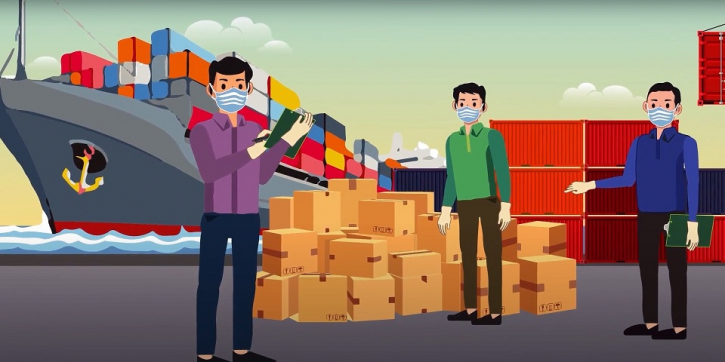Workplace health guidelines to ensure trade continuity amid Covid-19
BI Report || BusinessInsider

Photo: Chattogram Custom House Health and Safety Guideline
A series of customised guidelines have been prepared to ensure health and safety in workplaces so that trade and commerce can continue unimpeded amid the pandemic.
Prepared since March and finalised in June, most of the suggestions are still valid, speakers disclosed on Sunday at the first “Virtual Workshop on Workplace Health Safety for Business Continuity during Covid-19” for the Chattogram Custom House, according to a press release.
The event was organised by Business Initiative Leading Development (BUILD) and the Bangladesh Investment Climate Fund II (BICFII), which is being implemented by the International Finance Corporation (IFC) of the World Bank Group and funded by the Foreign, Commonwealth and Development Office (FCDO).
In her welcoming speech, BUILD Chief Executive Officer Ferdaus Ara Begum said Covid-19 had created a serious impact on trade and business in Bangladesh since March.
It is important to ensure proper hygiene and safety in the workplace to prevent any disruption owing to the risks of Covid-19, she further said, adding that the pandemic would boost automation.
Nusrat Nahid, private sector specialist at the International Finance Corporation, World Bank Group, mentioned that the World Bank Group had shared global guidance notes for trade policy and trade facilitation since the spread of the pandemic, but this was the first time that customised country-specific guidelines had been produced with the joint initiative of BICFII and the National Board of Revenue (NBR).
In a presentation on the health safety guidelines, physician Dr Mohammad Abul Hasnat underscored the need for creating a response team vested with the appropriate authority to ensure observance of safety guidelines and to isolate anyone with Covid-19 symptoms.
He stressed the importance of maintaining key measures such as staff involved in entry management and cleaning wearing personal protective equipment and ensuring that all staff and clients wear masks.
Temperature screening at the entrance, liquid soap dispenser to wash hands for at least 20 seconds, maintaining social distance of at least one metre, minimising paper-based interactions and face-to-face meetings, are also essential steps, the physician added.
M Fakhrul Alam, commissioner of Custom House, Chattogram said they had taken the relevant steps, including operating a quick response team to monitor the maintenance of the safety measures. As import and export had declined at the customs house, a duty roster has been introduced using 30-35 percent of officials at a time.
Md Zafar Alam, joint secretary and member of the Chittagong Port Authority (CPA) said the custom house and the port authority had to run on an emergency basis at the beginning of lockdown to ensure the logistics supply chain.
The CPA provided stimulus to workers of the port, produced and distributed sanitizers, installed hand-washing facilities, and held training sessions. Covid-19 PCR testing booths had been set up in the port as well, he added, along with isolation units and a separate hospital ward for patients.
These measures boosted the confidence of the personnel. Mobile courts monitor the observance of safety measures. Factories have opened and both import and export are being restored, he said.
But Michchu Saha, third vice president of the C&F Association, mentioned that the measures taken were strictly observed up to June only — in recent months, negligence has been observed regarding the wearing of masks, etc.
The customs house is overcrowded, he also claimed.
Mahbubul Alam, president of the Chittagong Chamber of Commerce and Industry (CCCI), and Amirul Islam Chowdhury Mizan, senior vice president of the Bangladesh Freight Forwarder Association (BAFFA), also spoke at the virtual workshop.
























